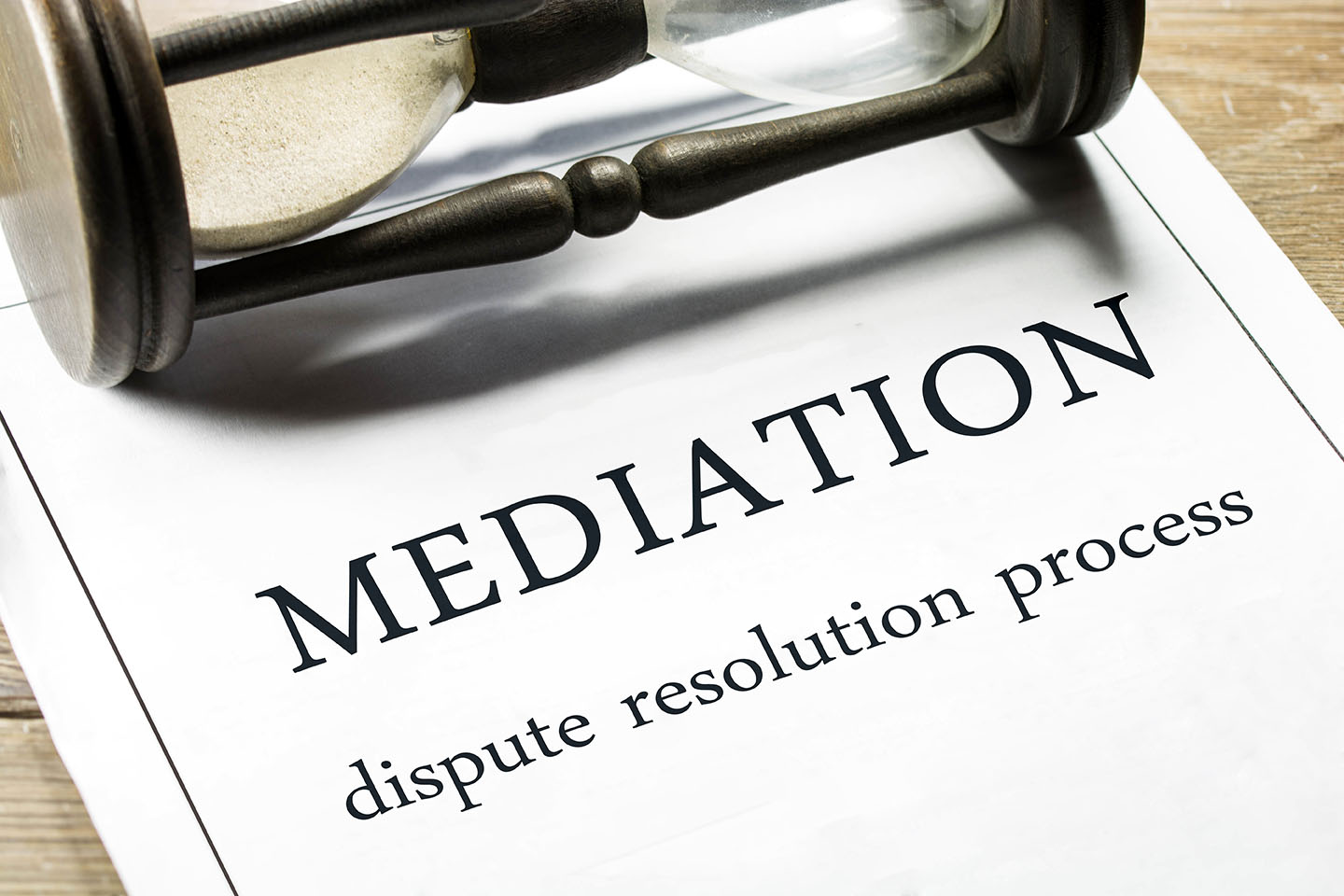Resolving Conflict through Mediation
Mediation is the process of voluntarily resolving conflicts through collaborative and peaceful means prior to or during litigation. The reality of dispute resolution can sometimes require the presence of a mediator, someone who has the means and experience to facilitate negotiation between conflictual parties and seek common ground. As a neutral third-party, a skilled mediator will provide an open atmosphere for communication, actively listen to your needs and the needs of the other party, offer problem solving techniques, and help navigate difficult situations to possible resolution.
Mediation is appropriate when one or both parties have the desire to be heard, have strong emotions to express, are not skilled at communication, need external structure, have had no success in past negotiation, want to have control over the process and outcome, disagree about the law, want to avoid the stress of litigation, want a fast resolution, cannot afford skilled attorneys, etc. If you and the other party are unable to overcome conflict alone and are willing to engage in the voluntary process of mediation, then you have already started moving in the direction of resolution.
Have questions about the mediation process or want to get to know the mediator? – schedule an introductory consultation. for $240.

THE HEART OF THE MEDIATOR IS THEIR NEUTRALITY
At Clackamas Mediation Center, LLC we know the success of the mediator is found through their ability to remain neutral. You know your needs, the situation, the conflict, and the resolution you are willing to accept best. In the past unproductive communication has ensured that you do not convey these clearly to the other party halting forward progress. The mediator will listen to you, use the available tools to ensure that you are heard by the other party, and make certain that any final agreement will protect you and your needs. Because the other party will receive the same attention and protection as you, the mediator’s neutrality has been established, and resolution is possible.
OUR PROCESS
Clackamas Mediation Center, LLC handles many types of mediation. Our simplified approach will take you through asking basic questions, ongoing mediation sessions, and conflict resolution or the “yes.” We offer two ways to get started:
- Have questions about the mediation process or want to get to know the mediator? – schedule an introductory consultation for $240.
- Ready to jump right into mediation sessions? – schedule your first session with a minimum retainer of $1,900
We recommend that all introductory consultations or beginning sessions have both parties present so that neither party feels left out. We can accommodate joint or separate introductory consultations. Upon retaining, your first session with a mediator will introduce the particulars of your specific case. Clackamas Mediation Center, LLC understands that mediation is not a one and done stop for conflict resolution. We are ready to commit the time necessary to help you with your individual dispute and expect to need multiple sessions beyond the planning stage to make progress. Throughout the process the mediator might require additional information, give assignments, or suggest individual meetings.
Depending on the form of dispute some mediation processes require court documents and paperwork. From the initial meeting to drafting and filing court documents, Clackamas Mediation, LLC can handle all needs, so that you do not have to even step foot in the courthouse.
To prepare for your mediation consultation please review our pamphlet “It’s Mediation Crunch Time”.

Family Mediation
Adoption
Although choosing to adopt a child can be an elating decision the process can is often difficult or confusing. Open adoption, where birth parents and adoptive parents agree to continue contact, necessarily involves a post-adoption contract.
See More
Both parties must reach agreeable terms on future communication and frequency. If initial negotiations are unsuccessful a mediator can skillfully step in to help both parties keep an open mind and focus on the safety and best interests of the child. Even contested adoptions, where one birth parent does not agree to the adoption, are often resolved by reaching an agreeable, post-adoption contract.
Custody and Parenting Time
Custody and parenting time issues are oftentimes the most contentious part of divorce or separation. Because the outcome is so important to each party, the court process becomes costly, emotionally draining, and difficult to resolve.
See More
A trained mediator will step into the disagreement and lead both parties to a compromise that they are willing to agree to. Custody and parenting time disputes resolved through mediation can create strong co-parenting skills whereas those same disputes resolved through litigation can produce never ending arguments. An added benefit of the mediation process is that mediated decisions are more likely to be followed because both parties were heard throughout the process and then voluntarily agreed to the terms of the decision.
Division of Financial Assets and Property
When it comes to the division of assets and property everyone is seeking a “fair” outcome. Yet, the definition of fair is situational and often up to interpretation. During litigation, the power is given to the judge; they listen to the arguments of both parties and determine what is fair.
See More
During mediation, the power remains with the parties; they have the option to choose and agree on what is fair. A mediator helps facilitate this agreement by ensuring that the parties remain conflict-free and solution focused. Other benefits of mediation are cost effectiveness, quick resolution, preservation of co-parenting relationship, and mutual agreement on the solution.
Divorce
Due to the many legal decisions and varying legal documents that must be filed divorces can be complicated. When you add in the emotional distress that accompanies many divorces, they can become overwhelming. Litigated divorces are costly, long, adversarial, and leave no winners.
See More
While solving these problems of the litigated divorce, mediated divorces are much cheaper, shorter, and resolution oriented. Mediated divorces also offer one huge benefit– they can be an emotionally fulfilling process! A skilled mediator will create an atmosphere where both parties can speak and be heard. While neither party needs to agree with the other, they will be required to listen. If an agreement is reached, our office will draft and file all necessary legal paperwork to ensure that the mediated divorce agreement is accepted by the court and enforceable by law.
Elder
Conflict between family members, parents, siblings, and children is a common part of aging. Mediation is one of many tools to address the conflict of this life change before it escalates out of control.
See More
Common topics for elder mediation include caregiving, housing, guardianship, wills and estates, safety issues, healthcare planning, relationship issues, and end-of-life decision making. The goal of elder mediation is to facilitate resolution to familial conflict while preserving the elder’s rights and voice. A mediator will help create resolution that is agreeable to all parties as well as facilitate the application of the agreement and future decision making.
Marital
Complementary to, but different than couples counseling, marital mediation is the process of working through marital conflict with the goal of staying together. This form of mediation is for couples who are struggling, considering divorce,
See More
have had unsuccessful past negotiations, dislike the label of “therapy,” or wish to utilize another set of professionals. The emphasis of marital mediation is working together for practical, behavioral resolution. A trained mediator will ensure that a peaceful atmosphere is maintained while the couple comes up with a creative solution to past conflict.
Post-Divorce
During the divorce process, both parties reach an agreement and file a judgment of divorce. When circumstances change, the judgment is no longer applicable, and a new agreement must be reached.
See More
Parties who have already been through a drawn-out court battle through the divorce process will find mediation a great change of pace. A skilled mediator will navigate the emotionally charged waters of custody, parenting time, and support modification. Even if both parties have remained amicable post-divorce, major life changes can create the need for a neutral third party. A mediator who knows the law and the possible outcomes for further litigation can help guide the parties to agreement prior starting the slow and costly process of litigation.
Separation
When starting the conversation of separation or divorce many people ask the question, what next? The separation process is new, and the unknowns can be overwhelming. Navigating the unknowns while dealing with conflict,
See More
finances, safety, living arrangements, and childcare can be difficult or next to impossible. A mediator will help distance the parties from uncertainty by creating a space where present needs are the focus. As a neutral party the mediator will make certain that mediation sessions are a peaceful process, giving both parties a break from conflict.
Business Mediation
Employment Litigation
Employment dispute cases commonly seek out mediation prior to litigation. Some of the benefits of mediating an employment dispute are cost effectiveness, faster resolution, flexibility of methods, flexibility of settlement,
See More
and the formation of realistic expectations for litigation. Even if mediation is unsuccessful a mediator who is knowledgeable about applicable employment law will have educated both parties about what they can expect if they were to pursue litigation.
Other Businesses
Some businesses find that other businesses and vendors are their largest source of conflict. The court system and litigation are adversarial in nature, both sides are pitted against each other.
See More
This is not ideal for those who must continue to work and maintain a professional relationship with the other party after court. Mediation does not have this problem. Not only are both parties required to work together, but they also remain in the presence of a mediator who is trained in preserving peaceful dialogue during conflict. The mediator stays in control of the dialogue structure while both businesses contribute to a possible solution.
Partners
Conflict between partners can be an inevitable part of being in business. Although you start out with common goals and ideas when you sign on the dotted line, the reality of partnership begins to create friction.
See More
Disagreements arise, solutions are proposed and ignored, relationships become strained, and communication halts. A skilled mediator will find the core of the dispute and help form creative solutions. Sometimes separation of partnership is the only next step. Yet, many businesses avoid moving forward because they believe the only way to protect their rights will be through a stressful, long, drawn-out, or expensive court battle. Mediation offers an amicable way to protect your rights while also remaining in control of the method and solution.
Small Businesses
Small businesses are just as likely to come into conflict with customers, vendors, employees, other business, or even internal partners as large companies. Unfortunately, where these larger companies are prepared for the conflict,
See More
the small business owner does not have the resources, time, funds, or staff ready to resolve these disputes. Mediation is a dispute resolution alternative that meets the needs of the small business owner. It is cost effective, fast, and produces amicable resolutions rarely found through litigation.
Workplace
Oftentimes, workplace disputes can be resolved within a company through managerial intervention. However, if this avenue does not see success, a neutral mediator can step in and apply their own experience with conflict resolution to the problem.
See More
One of the benefits of seeking a trained mediator to handle workplace conflict is that they will know the law and can guide both parties forward to a creative solution while also explaining what the result of further action would be.
Other Mediation
Other
Our mediators at Clackamas Mediation Center, LLC are not limited to the disputes outlined above. If you feel that your situation could benefit from a neutral third-party, please contact our office to learn more about the mediation process and how a skilled mediator can help you.

RESOURCES
SHOULD I HIRE A MEDIATOR?
Conflict resolution is not easy, so why mediate? The simple answer: mediation works. Trained mediators bring tools and experience to the conflict resolution process that can be essential to finding a path forward. The external structure and open atmosphere of mediation is conducive to problem solving. Oftentimes mediated agreements are more likely to be followed as the parties entered into the agreement voluntarily. Mediation can be faster, cheaper, and more emotionally rewarding than litigation.
If you and the other party are willing to compromise and make a genuine effort to reach an agreement, then you should seek a mediator.
WHAT ARE THE STEPS OF MEDIATION?
Mediation is a voluntary process, both parties must agree to the mediation process prior to selecting a mediator. Once the parties agree on pursuing mediation and agree on who will act as mediator, they will prepare to discuss their desired outcome with the mediator or prepare a document outlining their goals for mediation. Mediation consists of private conversations between the parties (plus their attorneys if they are present) and the mediator about the other person’s offer or position. Due to the confidential nature of mediation, the mediator will only disclose what you, or the other party, allow them to. Throughout multiple mediation sessions the mediator will attempt to form an agreement between both parties.
WHAT DOES THE MEDIATOR DO?
A mediator is a neutral third person who assists parties trying to make an agreement on disputed issues. They should have no bias or intent to favor one party’s interests over the other’s, but they can offer insight as to whether your requests are practical or if they think the other side will consider the offer that you’re proposing. Mediation is always confidential.
HOW DO I FIND A MEDIATOR?
Many parties choose to use an attorney or retired judge to act as a mediator in their divorce because they often have special knowledge about the law and know many ways in which you can resolve an issue. Our mediators are all trained in mediation services and specialize in family law related disputes. Family law problems often need a creative problem solver to help reach a solution.
WHEN SHOULD I HIRE A MEDIATOR?
A mediator can be hired at any point but will be most useful if you and the other party are both willing to compromise and make a genuine effort to reach an agreement. It is usually helpful to suggest mediation at the early stages of a case. Otherwise, if one or both parties are participating in bad faith the whole process can become a waste of time and money.
IS A MEDIATION CONFIDENTIAL?
Generally, mediation communications are confidential and cannot be used later in court against you. This confidentiality is important as it allows people to engage in the mediation process without future worries that their communications will be used against them. There are a few exceptions to the confidentiality requirements though, and so your mediator will explain to you what you can expect in your specific situation.
CAN A LAWYER MEDIATE A DIVORCE?
A lawyer can mediate a divorce so long as the lawyer does not represent either party in that divorce. If one party is represented by an attorney and one is not, that is considered a settlement negotiation between the attorney and the self-represented party. An attorney acting as a mediator will not represent either party and will not have the duties to either party that an attorney has to their client.
WHAT SHOULD I ASK FOR IN A DIVORCE MEDIATION?
This is something an attorney will be able to answer once a review of your marital assets and family needs has been done. You will want to plan to discuss custody (legal decision-making authority over children), parenting time, distribution of debts and assets, as well as whether one party will be required to pay spousal and/or child support to the other. Do not be afraid to take your time to consider any offers being made or to do some research before the mediation to understand what you will agree to and what you will not.
WHAT IS THE DIFFERENCE BETWEEN MEDIATION AND ARBITRATION?
Mediation is the process of collaborating with the other party to reach a solution using the help of a neutral third party. Arbitration is the process of hiring a neutral third party to make a binding decision on behalf of the parties once they each party presents their side.





